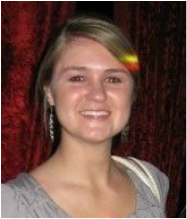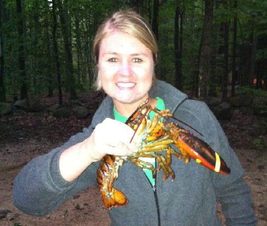 Happy Women's History Month! If you remember from last year, I like to use this month as an opportunity to highlight some really amazing women in science, technology, engineering, and math (STEM) fields from all around the world. I asked each of them to tell me about their experiences as a "woman in STEM" and, not surprisingly, each of them has a unique and different story. Our first guest blogger, and personal friend of mine, hails from Northwest Ohio where she earned her Bachelor of Science degree in Chemistry at the University of Toledo. She is now working with First Solar, Inc as a Chemist in the Materials Analysis Lab. First Solar manufactures solar panels for distribution around the globe, and Suzy Oancea is responsible for analyzing the products currently in production, using an X-ray Diffractometer, in order to find new, innovative techniques for various processes involved in the production of each panel. She has also been an active member of the American Chemical Society since she first joined the undergraduate student chapter during her time at Toledo. And when she's not at the lab bench, you'll most likely find Suzy outdoors with her husband and two dogs, working on their yard, improving their home in the country, or going for a swim. She is an avid fisher-woman and based on the photos she has of all the different fish she has caught, I'd assume she's pretty darn good at it! Here, Suzy tells us about the challenges she has encountered over the years and in her day-to-day life as a chemist in industry, from deciding which field to pursue in undergrad to how to troubleshoot an experiment. She also explains how a career in STEM almost always requires a high level of determination, desire, and the will to keep asking questions.  Growing up, from grade school to high school, there was always an odd trend in my grades based on the subjects I was taking. Year to year, my math skills were either great or substandard. I would excel at history two years in a row, but then decline for the next three, and then back at it the next year. English was always up in the air too. The one subject that always stayed consistent, and in a good way, was science. The interest, for me, has really always been there from the beginning. But around 2000, the new and incredible CSI series came out on TV, and I was truly hooked on science, like so many others. I immediately had a desire to pursue forensic science in college. After taking general chemistry courses/labs along with some criminal justice classes, I realized I had no interest in the law aspects of the forensic field. Understanding the legal procedures, learning the laws, and breaking down court cases to determine why/who was at fault was both dull and too circumstantial for me. A similar case with a different judge and/or jury may return a totally different verdict. It personally annoyed me and I decided this was not the path I wanted to continue on. After being unbelievably lost and disappointed in myself for making a wrong turn, I tried to take back the reins. I took a step back and came to a conclusion; questioning suspects, following leads, and solving the mystery wasn't what intrigued me; it was the lab work that really sparked my interest in the first place. Chemistry, here I come! "The interest [in science], for me, has really always been there from the beginning." STEM, as a collective field, is great to be a part of. It's an ever-changing world and there are so many possibilities ahead for students in STEM fields. The greatest feeling is after you run an experiment and find out something new or something you weren't expecting. For me, chemistry is a gratifying field where I am constantly learning. I'm always saving new journal articles to my computer to read and re-read, trying to figure out the next step in one of my experiments. The thing is; this is not a concrete and straightforward career. That may even be why I like it so much. Some weeks, I spend countless hours trying to decide how to work through an issue to produce data which may or may not be useful. I could spend a few months on a project that only yields a dead end, or I could spend a week on a project that ends up being a great success. Running samples with no conclusive result is the absolute worst. Consequently, at times, it can feel a bit hopeless, and it can definitely be stressful. Trial and error can be a big part of the job, but I love troubleshooting and thinking about the next step. It's hit or miss sometimes, but that's how we learn, right? "I could spend a few months on a project that only yields a dead end, or I could spend a week on a project that ends up being a great success...Trial and error can be a big part of the job..." Speaking of learning, I made the mistake of waiting until I was in college to start asking questions. Big FAIL on my part. I'm not sure why I took pride in trying to figure it all out on my own when I could have just sought out the answers from those with more experience to improve my knowledge and take another step forward. So many clever people are all around you in STEM fields and most of them are willing to share their insight. All you have to do is ask! Of course, you will have some people hold their true thoughts or feelings close to heart, but don't be discouraged. It doesn't make sense to me when people withhold information just for their personal gain, but it's honestly how this world works sometimes. All you can do is keep searching for answers in any way possible. Peers, articles, a forum, engineers from another company, conferences; try it all. It's never a good feeling to be lost with no direction, but it happens. Sometimes a lot. This is where you need to back up and take all the knowledge you have and start with the basics. KISS - Keep It Simple Stupid. That's what I always tell myself. Believe me, it's easier said than done, but it works! "All you can do is keep searching for answers in any way possible. Peers, articles, a forum, engineers from another company, conferences; try it all." "This is practice for the real world. When you get into the workforce, this will be what is expected of you. Write everything down." I'm paraphrasing, but this was said by...almost every teacher throughout my education in chemistry. Well, what do you know? It seems they were right. Now, I run an X-Ray Diffractometer (XRD) in a Materials Research Analysis Lab and I write up daily reports on what I do each day. Just like in undergrad lab! Believe it or not, I also have a lab notebook, and I write in it constantly. Meetings are common to discuss results from different experiments and instruments, and to compare new data. New methods and techniques are introduced and different ideas ultimately end up being utilized. Modifying an instrument or process is often necessary to accommodate a new experiment and knowledge of different tools becomes quite useful in this case. After being at the same company for a little over 4 years now, it's possible that the best thing I've learned for myself is: Never get comfortable. Always be flexible and ready to change or improve. So, as we continue Women's History Month, here's a shout out to all those gals (guys too) who ventured into this field. STEM fields are endlessly changing (in many ways) and it's awesome to see more women taking an interest every day. To address the elephant in the room: once in a blue moon, when someone asks what I do and I respond "I'm a chemist," I get 'the look.' Some of you may know what I mean. Raised eyebrows, slow head nod, distorted lips, basically the sense that they didn't expect a female to be in a science field. It used to offend me (am I not smart enough or something?), but now I am quite proud to surprise these people. It's possible that I may even change their reaction for the next female chemist they come across. More women are going into this field every year, which is so great for so many reasons. Common qualities like hard work, determination, and having the desire to excel (man or woman), is what makes STEM a growing occupation. To all the women in STEM out there, keep breaking the stereotype, one person at a time. Or something like that. :) "Never get comfortable. Always be flexible and ready to change or improve." Whether she's in class, lab, or out in the country, Suzy knows how to adapt. Being a woman in STEM has taught her how to be determined, but also how to adjust when things don't seem to be going quite right. Everyone is a little afraid to ask questions now and then, but in STEM, it's essential to never STOP asking questions. What questions do YOU have for our first guest blogger?
0 Comments
Leave a Reply. |
Hello!Welcome to Think Like a Postdoc. If you're a fan of science as much as I am, and/or are curious about getting a degree in a STEM field, or pursuing an interdisciplinary graduate degree (all from the perspective of a graduate student), then you're in the right place. Think Like a Postdoc also includes posts about my current lab and field research, including analytical chemistry, Arctic biogeochemistry, and energy & environmental policy. Comments and questions are always welcomed. And please tell me what you want to hear about next! Top PostsQuestions to Ask Before Choosing Grad Program
Dirt Popsicle First Semester of Grad School Field Work in Alaska Science Conference Dos and Don'ts Women in STEM Series Things I've Learned in Grad School Series Blogs I FollowMass Spectrometry Blog
Metabolon Compound Interest The Grad Student Way SouthernFriedScience Science Blogs Anthony's Science Blog The Thesis Whisperer GradHacker Fossils and Shit Science Communication Breakdown Science Communication Media Categories
All
Blog Archives
August 2017
|
 RSS Feed
RSS Feed

